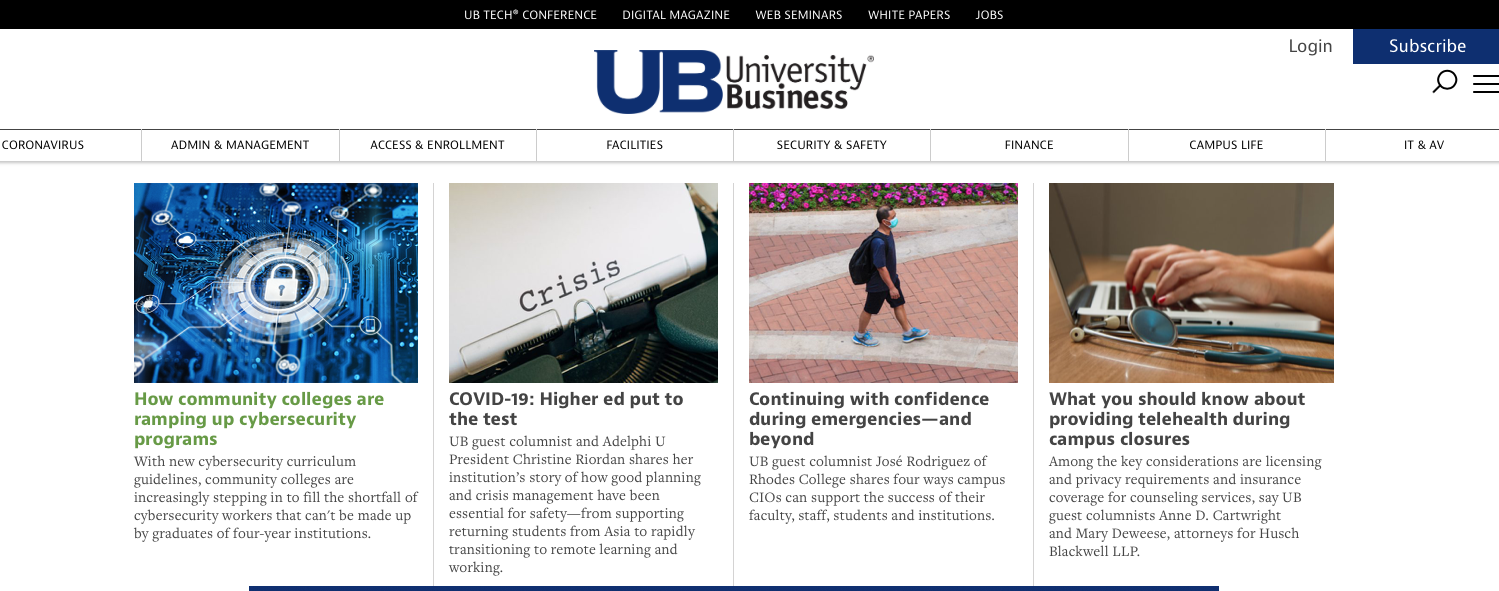Good planning put to the test by coronavirus outbreak—but so far, it's working.
This op-ed appeared in University Business on April 7, 2020.

While all of us in higher education have been dealing with the impacts of the novel coronavirus, and our crisis planning likely shares some common themes, our stories are unique to our campus communities. They are still being written, too, as the crisis continues to unfold.
Adelphi’s COVID-19 story started January 20 with the reports of a new coronavirus emerging in China just as our students and faculty were planning their return to campus for the start of spring semester. Our director of Health Services monitored the global health situation with local, state and national health authorities and prepared to screen and support our returning students from China and Asia. Our core crisis management team began meeting that week and engaged our International Services team to assist 12 students who were suddenly unable to return to the United States due to the February 2 travel ban. For them, we arranged remote learning or tentatively scheduled their return for summer or fall.
Our first campus message was sent on January 27 and included parents and families. It was the first of dozens of University-wide messages to date. Targeted communications—including translated versions—also went to international students, faculty, parents and guardians, and more. We shared most on our social media channels as well as online, on our newly created and comprehensive coronavirus information and frequently asked questions website.
The initial crisis team was led by our vice president of student affairs and dean of students in partnership with our director of Health Services. It included representatives from the president’s and provost’s offices, University communications, public safety, International Services and student life. Our vice president of diversity, equity and inclusion also participated to ensure sensitivity about discrimination.
By February 24, a full-blown international crisis began to unfold, with its U.S. epicenter soon to move toward metro New York, where Adelphi’s main campus is located.
It seems like months ago now, but that was the day I recommended our University’s escalation to a full Threat Assessment Team aligned with our Crisis Command Plan, and we initiated our University-wide Business Continuity Planning. Our Department of Public Safety and Transportation led exercises with a hypothetical confirmed case on campus. Our Office of Information Technology initiated our rapid transition to remote learning support. Our faculty began preparing syllabi and instructional methods for remote teaching. Our Office of Human Resources began readying for a remote workforce.
With the first case of COVID-19 confirmed in New York on March 1, the eventualities of a pandemic inundating our region and nation became apparent. On March 10, we sent our students home for an indefinite period of remote learning. On March 11, we worked urgently to bring home our students studying abroad before the U.S. borders closed. On March 16, we announced that classes would remain online all semester. As of March 23, only essential personnel remain on our Garden City campus to support critical operations. As of this writing on March 31, there are 75,795 confirmed cases in New York state—and the number continues to rise rapidly.
This pandemic has taken us all by unspeakable surprise—moving swiftly, powerfully, near and far. Our crisis management has been an essential component to keeping Adelphi safe and our mission paramount.
Our Level 1 crisis management and communications planning began in January. It escalated in five weeks to a Level 2 response—a Threat Assessment Team with an executive leader responsible for each area (operations, communications, academics, etc.). We were making rapid, monumental decisions on daily morning calls. Two weeks later, we moved into a Level 3 Incident and Emergency Management Structure, with teams managing six pillars of operations and reporting to one chief emergency director. Our Executive Emergency Management Team meets each morning—including weekends—and closes each day with situation reports. We continue moving forward with six overarching guiding principles:
- To protect the health and safety of all students, faculty, staff and guests from COVID-19 by applying guidance from public health authorities and subject matter experts.
- To take measures to help slow the spread of COVID-19.
- To mitigate risks to the mission and operations of the University.
- To anticipate and subvert recruitment, retention and enrollment challenges that may stem from the inability to meet classes in person, travel restrictions, embassy and consular closures, and fear.
- To plan for and mitigate significant financial challenges.
- To promote Adelphi’s values and ensure our community climate remains inclusive, welcoming and accessible to all.
Like most institutions of higher education right now, we transitioned to remote learning and working just in time—we were prepared to go online March 23, immediately following the prior evening’s New York state mandate.
We’ve been well guided by our crisis and emergency management and communications preparations, which will continue to be tested as this emergency situation unfolds over time. No doubt we will all be reviewing them again in the near future, with our new lessons learned in mind.
For further information, please contact:
Todd Wilson
Strategic Communications Director
p – 516.237.8634
e – twilson@adelphi.edu